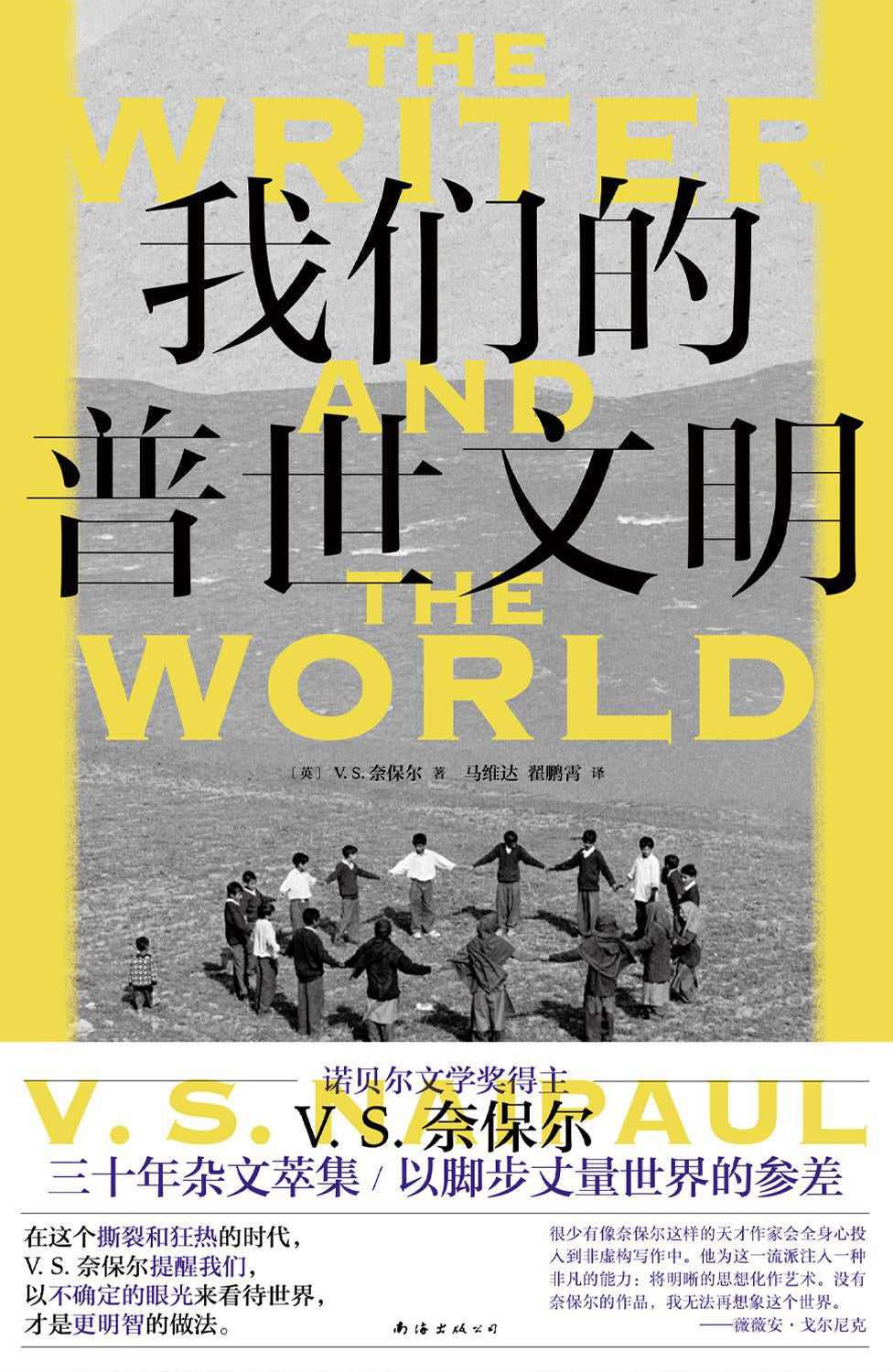WULOLIFE
《我们的普世文明》作者: [英] VS奈保尔 出版社: 南海出版公司 原作名: The Writer and the World
《我们的普世文明》作者: [英] VS奈保尔 出版社: 南海出版公司 原作名: The Writer and the World
Couldn't load pickup availability
Description
内容简介 · · · · · ·
布克奖·诺贝尔奖 双料得主 VS 奈保尔 生涯非虚构杰作萃集
📰 终生行走写作,整个世界都是他的书房
📰 一己之力将非抬高到诺奖级别
📰Chinese:
📰
📰《卫报》《纽约时报》《旧金山纪事报》等联合推荐,美亚4.6分口碑佳作
·
🌴通往你未曾抵达的角落
没有几位诺贝尔奖得主真打算去巴基斯坦或是刚果的边远地区,只为倾听奈保尔做到了。——伊恩·布鲁玛,《纽约书评》前主编
✍ 诺奖级别的非虚构写作
很少有像奈保尔这样的天才作家会一流派注入一种非凡的能力:将明晰的思想化为艺术.
💡
但他说的坏话深刻,知名,而且世界整个的进程仿佛就是为了证明他的卓见和先知。
·
这本书汇集作家VS奈保尔极为重要的二十篇游记及纪实作品,始于1962年的印度归终于1991年的拉美革命调查。奈保尔以脚步丈量世界的参从第三世界角落走到帝国主义中心,铭刻战后世界的分形态的现实困境。
在这段贯穿一生的旅行和写作中,他深情回望出生地特立尼达,那座人口仅有五十五万的殖民地小岛;也一次次地重返印度,那是父辈的故乡,是“一个我会怀着巨大的柔情想起、但最终又总是想要逃离的地方”;又将目光投向更远大的世界,如战地记者般闯入风暴的中心——在刚果新王的独裁国度,于丛林和河流中寻找黑暗的心;卷入布宜诺斯艾利斯的肮现身美利坚的选举现场,见证金钱、权力和电视如何谋杀智识和炮制民主。
·
这本文集里的文章,是我的一生历程的重要组成部分。在那些日子里,我常常接受委托,踏上旅途去写作,这对于的能力而言,也许既是一种挑战,也是一种扩展。这是一段美妙的经历,而本书的读者可以把它当作那个时代的纪念品来加以端详。——VS奈保尔
·
使我们看到了被扭曲的历史的存在,并激发了我们探寻真实状况的动力。——诺贝尔文学奖颁奖辞
奈保尔是英语文学大师。——JM库切,诺贝尔文学奖得主
奈保尔是一个生活体验很丰富、视野很广阔、写作很努力的作家。他的作品里有一股狠劲,一种深深的冷,以绝望来把握希望。——麦家
我管我也没学会,我特别想获得他那样细腻的描述能力。——许知远
但他说的坏话深刻,知名,而且世界整个的进程仿佛就是为了证明他的卓见和先知。
他的文体为他表达这些感知提供了完美载体。——马丁·艾米斯,知名作家
很难想象有哪位作家是比奈保尔更彻底的流亡者,在他的内心容纳了那么多相互冲突的、正在湮灭的世界。但更引人注目的是,虽然消逝的辉煌与成就强烈地刺激着他,对欺骗与悲剧的敏锐洞察也让他痛苦万分——这些是他的背景与经历的不可分割的一部分——但他仍然保持着一种毫无怨尤、乐观向上的态— —潘卡吉·米什拉,作家,“全球百大思想家”之一
很少有像奈保尔这样的天才作家会全身心投入到非虚构写作中。他为这一流派注入一种非凡的能力:将明晰的思想化为艺术。他是一位以语言为敌人的作家:他鄙视美丽的文字,如同鄙视神秘主义。他认为,努力观察,甚至更努力地思考,用最简单、最清晰的语言弄清会得到一个故事。没有奈保尔的作品,我无法再想象这个世界。——薇薇安·戈尔尼克,知名女权作家
他嫌弃大而化之的概括,他听人们说话,Chinese: Description然后他那警觉、从不感伤、对浪漫主义矫情充满怀疑的大脑会对这些细节观察进行过滤。没有几位诺贝尔奖得主真打算去巴基斯坦或是刚果的边远地区,只为倾听无名人物的故事。奈保尔做到了。这表现了一种伟大的谦虚,从最低微的印尼人、最平凡的巴基斯坦人、最穷苦的非洲人身上,他依然能够看到自己的痕迹。——伊恩·布鲁玛,《纽约书评》前主编,纽约巴德学院教授
奈保尔因直率的洞察力而为政治正确的陈词滥调提供了解毒剂。——《英联邦文学期刊》
在一个非黑即白的时代,VS 奈保尔的复杂性提醒我们,以不确定的眼光来看待事物,才是更明智的做法。——《卫报》
只有奈保尔能做到,对那么多东西持否定态度的同时,又将它们阐明得一清二楚……他总是直言不讳,直抵症结——作品充满了无所顾忌的傲慢陈述和一针见血的深刻洞察。——《旧金山纪事报》
这些文章充分表明,他是一位真正的世界公民,他获得诺贝尔奖当之无愧。——《苏格兰周日报》
洞察力,启发,挑衅——奈保尔成功且丰富地展现了作家如何参与和探索世界。——《圣地亚哥联合论坛报》
当今最杰出的英语作家,他和历史的疯狂之眼对视》
机敏中带有刻薄,通透而又直言不讳。奈保尔所展示的是真实的世界。——《标准周刊》
作者简介 · · · · · ·
VS 奈保尔(VS Naipaul)
英国作家。1932年生于特立尼达岛上一个印度移民家庭1950s
50 years ago 2001 年获诺贝尔文学奖。
2018, 8 months, 11 months, 2018, 2018, 2018, 2018
目录 · · · · · ·
迈克尔·X与特立尼达黑权运动谋杀案:安宁与权力刚果新王:蒙博托与非洲虚无主义亚穆梅勒登台的纽约斯坦贝克在蒙特雷阿根廷与伊娃·庇隆的幽灵空调气泡:达拉斯的共和党人紧Description
